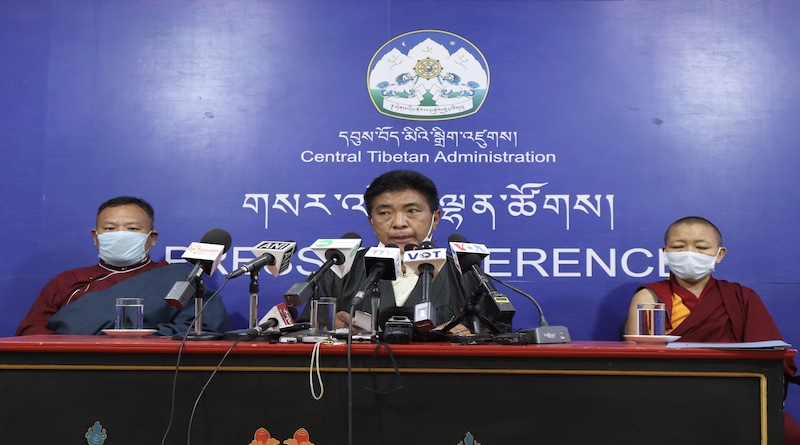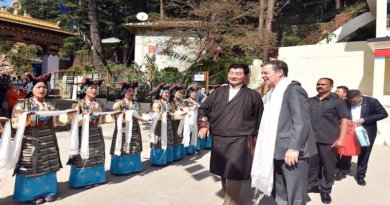EC declares open 2021 election for Sikyong and members of 17th TPIE

DHARAMSALA, 5 Aug: The Tibetan Election Commission today declared open the 2021 election for the Sikyong(President) of the Tibetan people and Chitue (members of Parliament).
“We hereby officially announce the commencement of the 2021 Elections of Sikyong and the members of the Tibetan Parliament-in-Exile,” said Wangdu Tsering Pesur, the Chief Election Commissioner(CEC) of the Central Tibetan Administration flanked by the two newly elected Additional Election Commissioners on both sides.
The CEC stated that “despite the current challenges precipitated by the COVID-19 crisis,” the office remains “committed to conducting the 2021 general elections as per the stipulated time period.”
The Election Commission directed “Regional Election Commissions and every Tibetan to take part in the polls in the interest of the Tibetan cause and in the spirit of unity,” as it stressed the outcome of the election will have “significant impact on the future of Tibetan people and the freedom struggle.”
“Hence as a society, we must collectively endeavour to promote an effective electoral process while firmly upholding the Tibetan unity and integrity, It should also be noted that the Tibetan election is being observed by justice and peace-loving individuals and governments around the world with much respect and support,” the CEC added.
The commission further announced that it will conduct new voter registration as laid out in the Article 17, 18, 20 and 21 of the Tibetan Electoral Rules and Regulations which deals with the provisions for voter registration.
The CEC said that the move was initiated “in order to have a properly verified list of registered voters” and thereby urged all regional election commissions as well as the public at large” to ensure that every Tibetan who is eligible to vote are registered.
As per the Charter of Tibetans in Exile, Tibetans holding updated Green Book who have attained the age of eighteen are entitled to the right to vote.
The EC also urged the public to “exercise responsible use of digital platforms and remain vigilant against the disruptive activities of elements in the society and agents from outside seeking to incite communal disharmony.”
The office further called on the “Media to remain truthful, unbiased and act with great restraint and responsibility towards society” and “to play a constructive role and support the Election Commission, CTA in its endeavours to promote a smooth and successful election.”
The conference also saw the EC launch its official Website which aims “to promote electoral literacy among the Tibetan community and to provide accessible information on issues relating to Tibetan elections.”
The Election Commission further issued a 12 point guidelines for the electoral candidates of the 2021 Elections of Sikyong and Members of the 17th Tibetan Parliament-in-Exile:
1. Both Sikyong and Chithue candidates cannot make use of the photo of His Holiness the Dalai Lama, the logo of CTA, Tibetan National Flag and the map of Tibet in any of their election campaign materials.
2. While adhering both in letter and spirit to the Charter of Tibetans-in-Exile and the
Electoral Rules and Regulations, it is also very important to strictly follow the guidelines issued by the Tibetan Election Commission. Guided by the core ideals of equality and justice and based on the principles of an administration of the people, by the people and for the people, all candidates must shoulder responsibility in maintaining the traditional Tibetan values in general, and in particular the values of ethics, harmony and unity.
3. Candidates shall conduct their campaign activities with due respect to the set rules and regulations and in accordance with the law of the land. In the course of their campaign, candidates must not indulge in character assassination of their counterpart. There should not be any mud-slinging based on caste and creed, religious faith and regionalism. The candidates must refrain from any activity which impairs the spirit of Tibetan unity. Besides, candidates shall avoid any corrupt practices such as bribing and intimidation of voters.
4. Candidates must respect the fundamental rights of their voters. They shall not misuse their physical or monetary power to force voters to vote or not to vote. Similarly, they cannot be compelled to withdraw their nomination.
5. No candidates shall organize public or press meetings for the purpose of distributing false and malicious campaign materials or make such announcements.
6. Candidates must respect the law of the land and abide by the guidelines issued by the Election Commission. No person is allowed to cause any obstruction in any ongoing meeting of a candidate.
7. As per the article 24 (7), no association of the three traditional provinces, religious denominations, non-governmental organizations can nominate or promote any candidates for Sikyong and Parliamentary elections. Candidates cannot channelize their campaign through them.
8. No electoral campaign practices are allowed in the schools.
9. Candidates must remain alert and mindful of any deliberate incitement or provocation in social media
10. Candidates shall inform the concerned settlement office for any public gathering to undertake their electoral campaign.
11. Candidates can carry out their campaign practices during preliminary as well as final elections. However, as mentioned in Article 24 (7), they shall cease their campaign two days prior to the election day until the announcement of results. On the day of the election, nobody can try to influence voters by any means.
12. If anyone is found guilty of violating any of the above-mentioned guidelines, the Election Commission will mete out punishment based on the severity of violations.
The Tibetan parliament consists of 45 members: ten members each from U-Tsang, Do-tod and Do-med, the three traditional provinces of Tibet, two members each from the four schools of Tibetan Buddhism and the traditional Bon faith, two members each from Europe and North America and a member representing Tibetans in Asia and Australasia (excluding India, Nepal and Bhutan).





